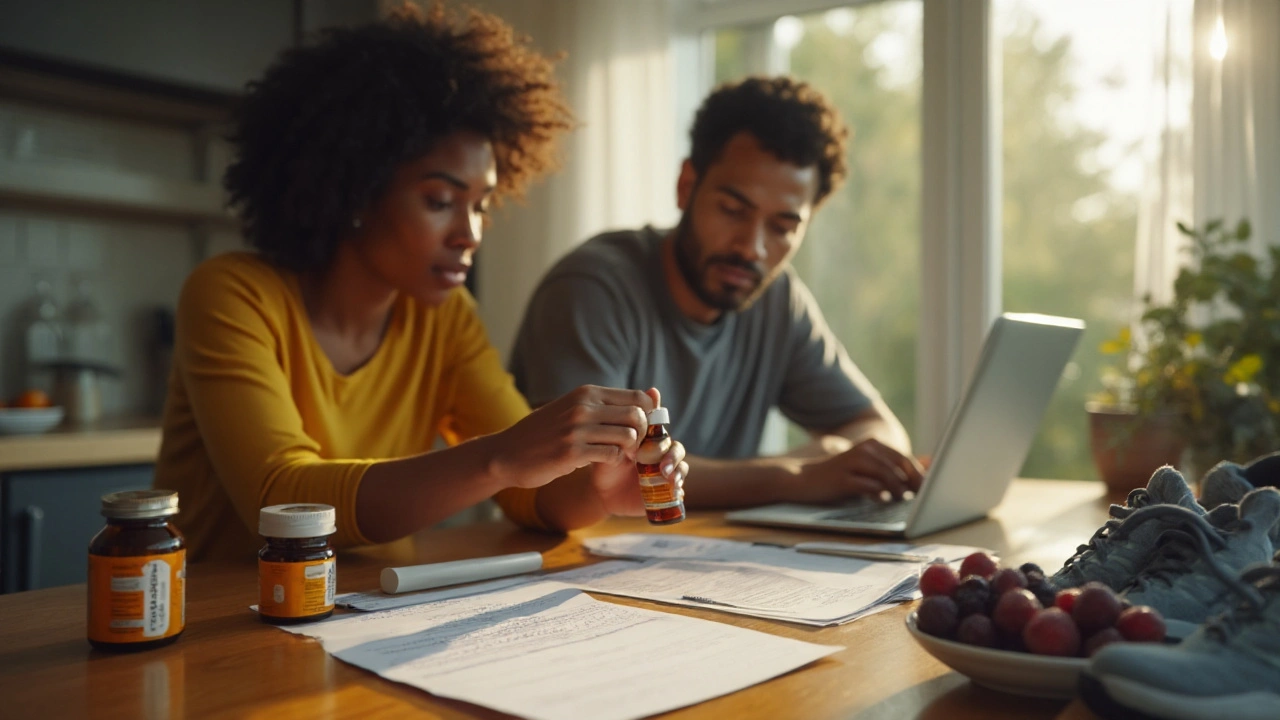Safety and Side Effects: What You Need to Know
When you pick up a prescription or a supplement, the first thing to ask yourself is "Is this safe for me?" Most people think about the benefit, but the risks matter just as much. On this page we collect the most practical tips and common warnings for popular medicines, from antibiotics to skin creams. You’ll get straight‑forward advice on how to read labels, what side effects to watch for, and when to call a doctor.
Our guides cover real‑world scenarios. For example, the Bactrim article explains how to spot a legitimate online pharmacy and what side effects like rash or stomach upset could mean. The Cialis guide walks you through dosage choices and warns about unexpected heart symptoms. The hydroquinone‑mometasone‑tretinoin combo article breaks down skin‑lightening risks and the newest 2025 regulations. Each piece is written in plain English so you can act fast if something feels off.
Common Questions About Medication Safety
People often wonder if they should stop a drug as soon as they notice a mild side effect. The short answer: don’t quit on your own. Talk to a pharmacist or doctor first. Mild nausea, a headache, or mild skin irritation can be normal when you start a new drug, and a professional can suggest an adjustment rather than a stop.
Another frequent question is whether weight matters for safety. With weight‑based dosing, a heavier person may need a higher dose, but that also raises the chance of stronger side effects. Our dosage calculators help you match the right amount to your body weight, reducing guesswork.
Interactions are the silent culprits behind many adverse reactions. If you take paroxetine (Pexep) for anxiety, adding an over‑the‑counter sleep aid could boost drowsiness. Our interaction alerts flag common combos so you can avoid surprises.
How to Spot Unsafe Products Online
Buying medication on the internet can be tempting, but fake pills are a real danger. Look for pharmacies that require a prescription, display a physical address, and have a verified contact number. If a site offers a huge discount without asking for a doctor’s note, treat it as a red flag.
Check the packaging. Authentic products have clear batch numbers, expiry dates, and tamper‑evident seals. If the label looks blurry or the logo is off, the product could be counterfeit.
Finally, read reviews, but take them with a grain of salt. A few negative comments about side effects may point to a real issue, while overly glowing reviews can be marketing fluff. When in doubt, choose a reputable local pharmacy or ask your healthcare provider for a safe source.
Safety isn’t a one‑time check; it’s an ongoing habit. Keep a list of every medication, supplement, and over‑the‑counter product you use. Review it with a pharmacist every few months, especially when you start a new drug. By staying informed, you protect yourself and get the most benefit from each treatment.
Explore the articles below for deeper dives into specific drugs and conditions. Each guide gives you the side‑effect profile, warning signs, and practical steps to stay safe. Remember, this site provides educational info only—always talk to a qualified professional before making any changes to your health routine.
- September 8 2025
- 7 Comments
- Daryl Gardner
Procaine Supplements: Real Health Benefits, Risks, and UK 2025 Guide
Curious about procaine supplements? See what science says, real risks, UK 2025 rules, safer alternatives, and a clear checklist to decide what to do next.
- September 1 2025
- 10 Comments
- Daryl Gardner
Astragalus Benefits, Dosage, and Safety: A Clear 2025 Guide to This Immune-Support Herb
Curious about astragalus? Learn the real benefits, safe dosage, who should avoid it, and how to pick a quality product in 2025-without hype.
- Health & Medicine (141)
- Health & Nutrition (8)
- Caregiving & Dementia (2)
- Health & Wellness (2)
- Environment & Climate (1)
Categories
- February 2026 (11)
- January 2026 (24)
- December 2025 (27)
- November 2025 (22)
- October 2025 (27)
- September 2025 (38)
- August 2025 (5)
- July 2025 (4)
Archives
- side effects
- generic drugs
- medication safety
- medication side effects
- medication adherence
- dosage
- online pharmacy
- gut health
- generic substitution
- safety and side effects
- natural antioxidant
- coping strategies
- hypertension
- drug interactions
- immunosuppressants
- mental health
- MedWatch
- drug safety
- NTI drugs
- narrow therapeutic index

